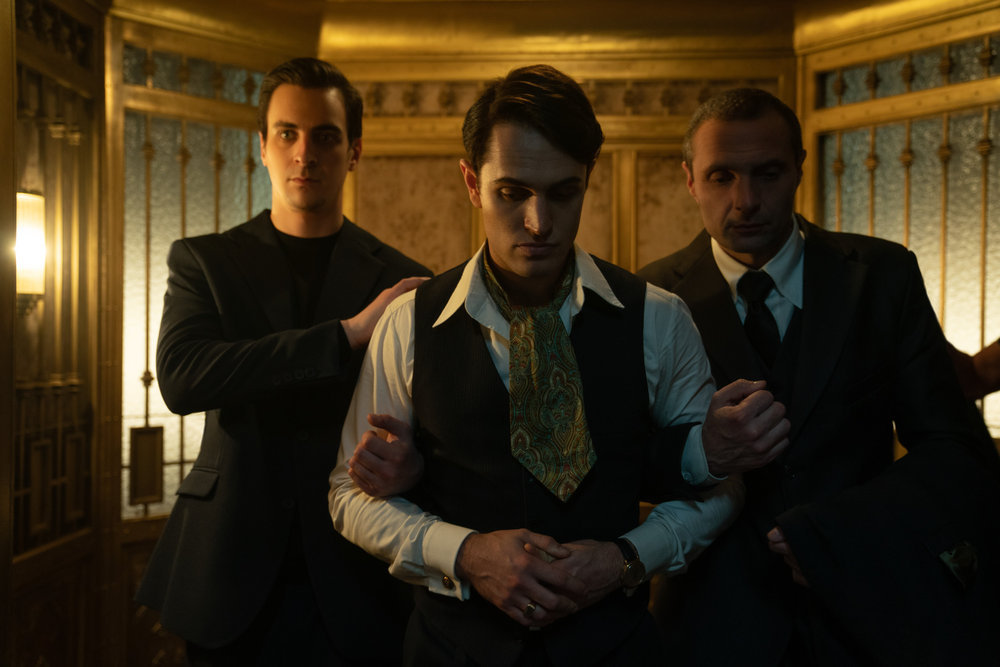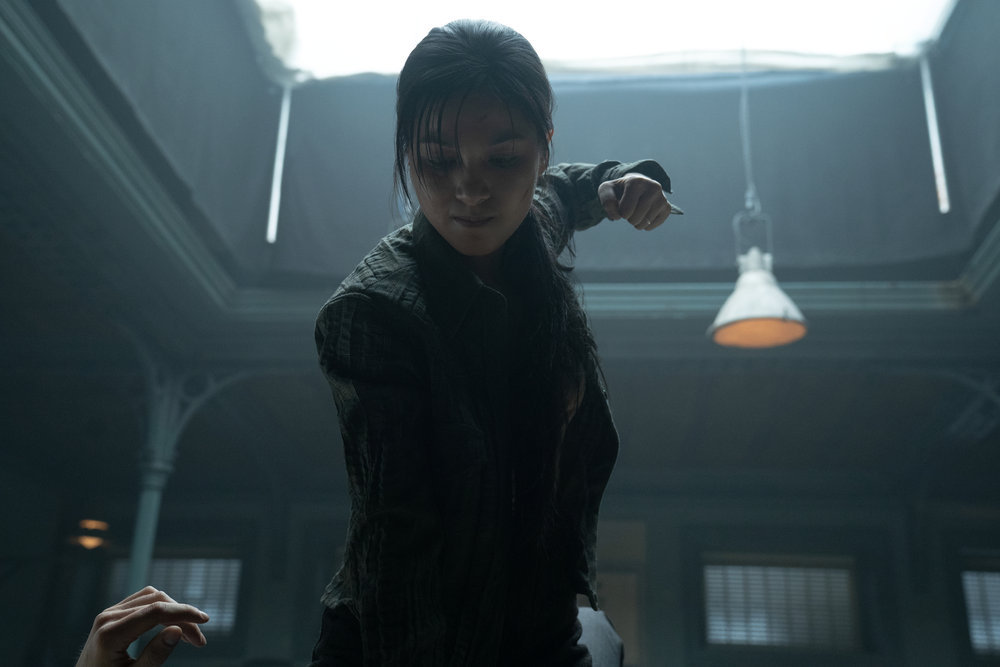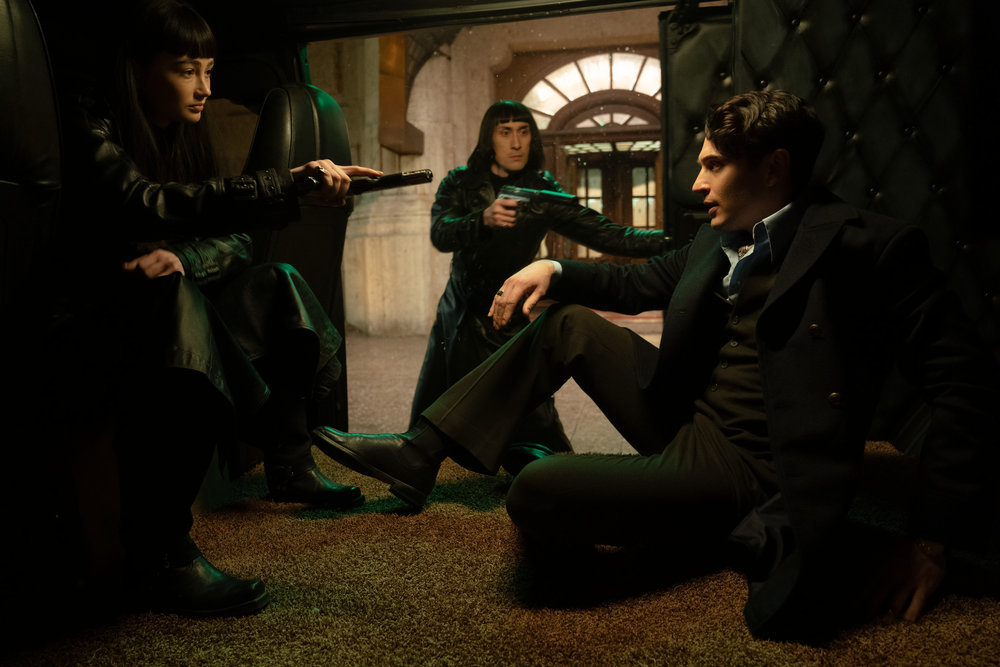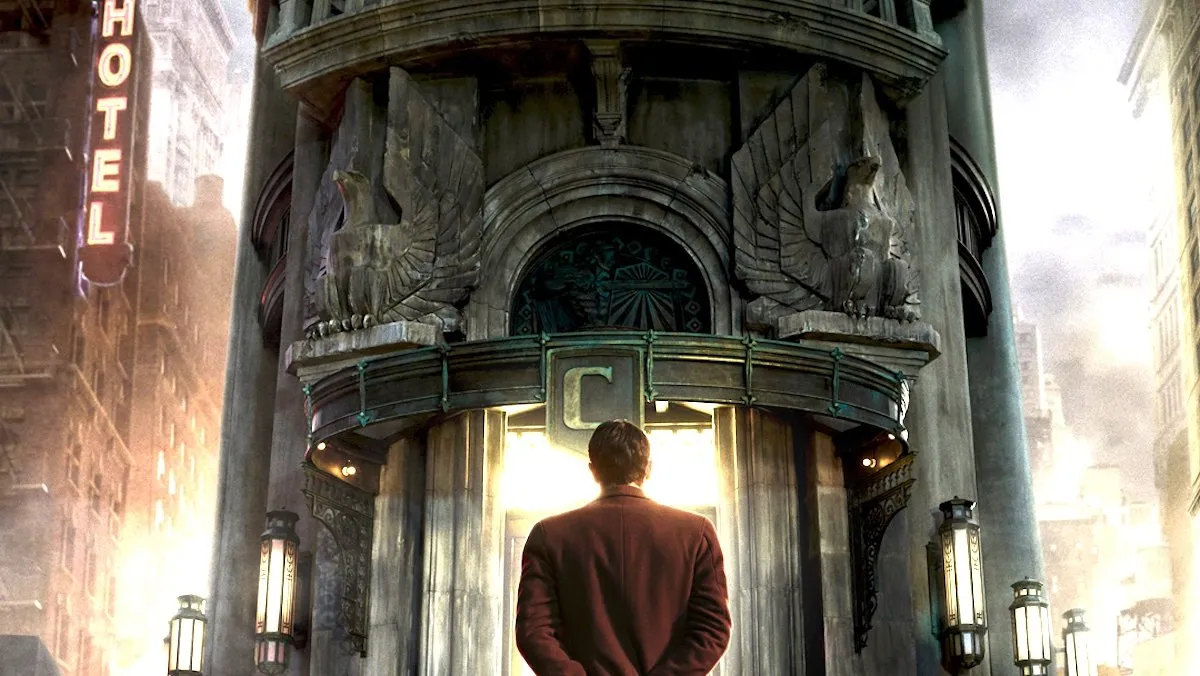John Wick movies are very much vibe-driven. They are atmospheric, stylish, and sleek. The actual plot of the films is mostly incidental. Instead, the franchise largely exists as an opportunity to watch cool people doing cool things while looking cool. In this more than anything else, The Continental: From the World of John Wick is a worthy spiritual companion to the film franchise.
This three-episode miniseries is an extended prequel to the film franchise. It follows a young Winston Scott, the hotel proprietor played by Ian McShane in the movies and by Colin Woodell here. Dragged back to New York by the sinister Cormac O’Connor (Mel Gibson) to recover a stolen artifact, Winston finds himself embroiled in a world that he tried to escape. A high-stakes game of subterfuge and violence ensues against the backdrop of “Fear City.”
The Continental is steeped in the iconography of those John Wick movies. Obviously, the bulk of the action unfolds in and around the hotel that serves as an anchor for the first three films. The series dutifully recycles a host of familiar imagery. The hotel’s lobby appears just under an hour into the first episode. Winston holds one conversation in a room decorated with guns. Gold coins are traded. There is gratuitous Latin. Subtitles are rendered in cool fonts. Characters debate the merits of conducting business “on Continental grounds.”
There are other broader similarities. Ray McKinnon plays Gene Jenkins, a folksy sniper whose character evokes that of Willem Dafoe’s Marcus from the original John Wick. Katie McGrath plays “the Adjudicator,” filling the same role on behalf of the High Table that Asia Kate Dillon played in John Wick: Chapter Three – Parabellum. At one point, Winston seeks an alliance with Mazie (Zainab Jah) from the Bowery, an obvious predecessor of Laurence Fishburne’s Bowery King.
However, what is most interesting about The Continental isn’t how it’s similar to the John Wick films. It is, instead, the ways in which it is different. The miniseries has a very strong vibe, but that vibe is entirely its own. It eschews a lot of the clean and smooth aesthetic of the Chad Stahelski movies in favor of something decidedly grimier and grittier. The world of the show is a lot less streamlined and a great deal rougher around the edges.
A lot of this is in the production and direction. The Continental is written by Greg Coolidge, Kirk Ward, and Shawn Simmons, with an assist on the second episode by Ken Kristensen. However, the screenplay is perhaps the weakest element of the miniseries. Granted, the John Wick movies have always threaded a fine line between endearing stupidity and charming pretension, but The Continental makes the four films in the series sound like works of high literature.
Related: Where Is The Continental Hotel in John Wick?

THE CONTINENTAL: FROM THE WORLD OF JOHN WICK — “Night 1” — Pictured: Colin Woodell as Winston Scott — (Photo by: Katalin Vermes/Starz Entertainment)
In the first episode, Winston interrupts a pair of gun dealers by taking one of their number, Lou (Jessica Allain) hostage. “In hindsight, that was a mistake,” he admits during the ensuing stand-off. One of the arms merchants, Lemmy (Adam Shapiro), counters, “No, that ascot is a mistake.” Winston corrects him, “It’s a cravat.” This is the standard of the show’s wit. Later on, Lemmy opines that Winston’s brother Frank (Ben Robson) is “like Casper, the… un… friendly ghost.”
Later in the premiere, Winston warns his brother, “You wanna hole up in this place until they come and kill you? That’s not a plan, Frankie. That is an unscheduled funeral.” It raises the question of whether Winston plans to schedule his own funeral. When Winston remarks that O’Connor has grown old in the years since they last saw one another, the hotel manager replies, “I’m wearing a diaper. You know, they oughta call this place the InContinental.” The dialogue is not great.
There are times when the miniseries struggles with tone. Gibson is very obviously the star draw here, a genuine 1990s movie star humbled by scandal and controversy. Even in the villain role, Gibson gets top billing. Director Albert Hughes has described the performance as “a cross between Joel Silver and Donald Trump,” that somehow suggests more subtlety and nuance than Gibson offers. Chewing eagerly on the scenery, Gibson offers one of the most cartoonish Noo Yawk accents in living memory.
The scripting of The Continental is very clumsy. The miniseries often lacks the mannered specificity that defines the film franchise. However, the show largely works in spite of the writing. A large part of this is down to the influence of Albert Hughes, who directs the first and last episodes of this triptych. With his twin brother Allen, Hughes emerged as part of a wave of young directorial talent during the 1990s, and The Continental showcases Hughes’ distinct style.
According to Hughes, the instruction that he got from Stahelski was “[D]o your own thing, make it yours.” He certainly follows that advice. Working as a duo, the Hughes Brothers made films that feel firmly anchored in particular times and places. Menace II Society was a snapshot of Watts and Crenshaw at a particular moment in time. Dead Presidents was set against the backdrop of 1970s New York. Even From Hell was steeped in the atmosphere of 19th century London.
Related: Where and When to Stream John Wick Spin-Off the Continental

THE CONTINENTAL: FROM THE WORLD OF JOHN WICK — “Night 2” — Pictured: Nhung Kate as Yen — (Photo by: Nelly Kiss/Starz Entertainment)
So, while the New York City that appears in the John Wick films has a sort of vague or abstract quality, it makes sense that The Continental feels much more anchored in a specific time and place. Flashbacks are dated specifically to 1955. References to an ongoing garbage strike place the bulk of the action in either 1975 or 1981. The opening action sequence places the Continental itself directly above the Wall Street Subway station.
The soundtrack is saturated with 1970s anthems. That introductory set piece roars to life with “I Feel Love” by Donna Summer, then segues into “Jingo” by Santana. There is a reasonable criticism to be made about the overuse of needle-drops, but the show’s maximalism is almost endearing, casually dropping tracks like “Chicken Strut,” “Crimson and Clover,” “Yes Sir, I Can Boogie,” “The Boss,” “Daddy Cool,” “Baker Street,” “One is the Loneliest Number”, and (of course) “Barracuda.”
Hughes also infuses the series with his own directorial sensibility. Stahelski is a former stuntman, and so his direction tended to foreground action choreography. For the most part, Hughes avoids inviting direct comparisons. He instead focuses on his own unique skill set as an action director. The Continental features a number of more stylistic cinematic single takes that mirror those employed by Hughes and his brother in films like The Book of Eli.
The Continental’s status as part of a series is almost a disappointment as it rushes towards its climax, drawing more heavily from the film series, riffing on particular scenes, and even quoting specific lines. It doesn’t help that the narrative is overstuffed with characters, likely a result of stretching the series to run four-and-a-half hours. Not all of the show’s resolutions feel particularly satisfying or earned. Indeed, McGrath gets a somewhat thankless role as the Adjudicator, who seems to exist largely as a continuity reference.
Still, it’s to Hughes’ credit that The Continental is never completely subsumed by these homages and references, maintaining its own similar-yet-distinct pulpy vibe. Even when it is most directly invoking the John Wick films, it feels like The Continental is having fun. Like the best of the modern fan service brand extensions, The Continental is clearly enjoying the sensation of smashing the toys together and seeing what happens.
Related: The Continental Trailer Teases John Wick Prequel with Lots of Guns…and Mel Gibson

THE CONTINENTAL: FROM THE WORLD OF JOHN WICK — “Night 3” — Pictured: (l-r) Marina Mazepa as Gretel, Mark Musashi as Hansel, Colin Woodell as Winston — (Photo by: Katalin Vermes/Starz Entertainment)
In some ways, even beyond its period setting, The Continental feels like something of a throwback. In recent years, it has seemed like the future of streaming will look more and more like classic television. Services like Amazon and Disney have moved back towards the weekly release model, even releasing shows like Rings of Power and Ahsoka in prime time slots, as if trying to recreate the sensation of classic “appointment television.”
Most obviously, The Continental feels like an actual self-contained miniseries. It doesn’t feel like a streaming show where the entire first season “is the pilot.” This is obvious in the way that the series ties together all of its loose ends in the finale, however abruptly. More than that, while the individual episodes have titles, they are identified as “Night One,” “Night Two,” and “Night Three.” The implication is that this isn’t just a standard streaming show. It is an event. These aren’t just ninety-minute blocks of television, they are an entire night.
The Continental seems designed to evoke the golden age of the American television miniseries during the 1970s, which arguably began with Rich Man, Poor Man and continued through Roots, Backstairs at the White House, Blind Ambition, and Ike. These productions were television events, often aired during network sweeps, perhaps the closest that American network television came to offering blockbuster spectacle to contemporary viewers.
Like The Continental’s Albert Hughes, these projects often attracted respected film directors from outside the mainstream. Tobe Hooper directed Salem’s Lot, Franco Zeffirelli directed Jesus of Nazareth, Dan Curtis directed The Winds of War. These shows also tended to attract aging movie stars for celebrity wattage, not unlike Mel Gibson in The Continental. David Niven headlined A Man Called Intrepid, Martin Sheen starred in Blind Ambition, while James Mason played the villain in Salem’s Lot.
The Continental undeniably has its share of issues. There is a bit too much noise and there are a few too many guests cluttering up the narrative. However, it’s an undeniably stylish and assured piece of event streaming. It has swagger and vibes to spare. The miniseries renovates a familiar piece of architecture, striking a fine balance between the expected pleasures and its own distinct identity. It’s worth a check-in.






Published: Sep 20, 2023 11:00 am